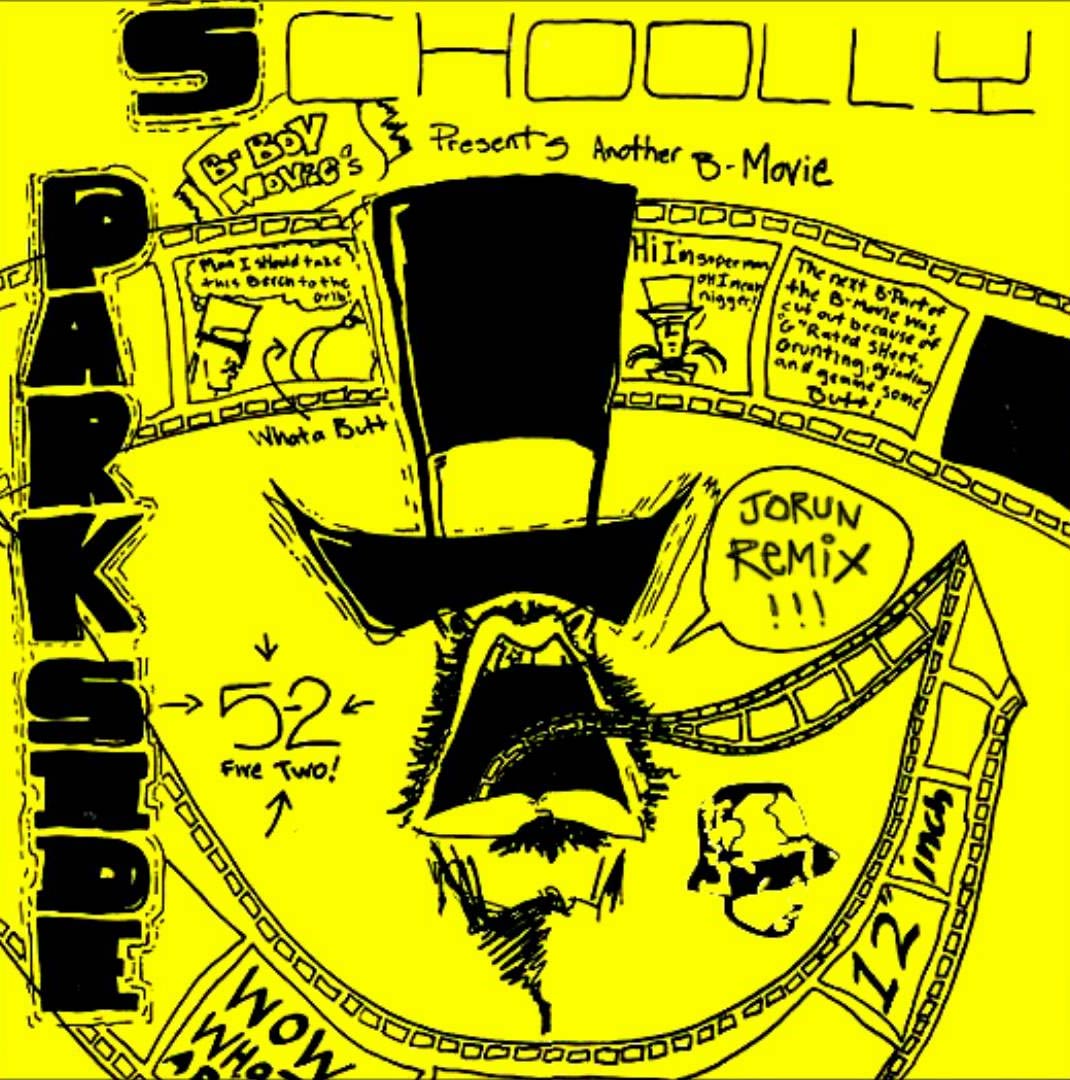Schoolly D is an American hip hop artist, widely acknowledged as a pioneer in the gangsta rap movement. In the mid-1980s, he enjoyed cult success with his raunchy and streetwise lyrics, but eventually faded away into obscurity. Apart from recording and producing music, Schoolly D also designed his own album covers, some having a comic strip format, with illustrated narratives.
Musical career
Jesse Bonds Weaver, Jr. was born in 1962 in Philadelphia, Pennsylvania. During the early 1980s, he started performing as a hip hop artist, picking out the name "Schoolly D". He quickly gained notoriety with his uncompromising lyrics. Admiring the subversiveness of early rock 'n' roll, he took rap to the same direction. Schoolly D openly rapped about sex, violence, racism and the grim reality of living on the streets. At the time, hip hop was still a subculture and the only artists with some mainstream success were people like the Sugarhill Gang, Kurtis Blow, Afrika Bambaata and Run D.M.C. All of them, except Grandmaster Flash & the Furious Five, had a clean public image and avoided controversy. Therefore Schoolly D struck a nerve. His songs 'P.S.K. (What Does That Mean?)' and 'Gucci Time' (both from 1985) became underground hits and his albums 'Schoolly D' (1986) and 'Saturday Night!' (1987) also gained a certain popularity.
In 1986, Flemish MTV veejay Marcel Vanthilt and a Dutch TV crew made a documentary about hip hop, filming in New York City. One of the artists they interviewed was Schoolly D. Thanks to this film, Schoolly D also gained more notability in the Netherlands. When the documentary was broadcast on Dutch television as 'Big Fun in the Big Town' (1986), it converted many young viewers to hip hop. Decades later, the Dutch hip hop band Osdorp Posse sampled Schoolly D's speech about the rawness of hip hop in 'Big Fun in the Big Town' on their track 'De Wet van T.O.K.I.O.' from their album 'Harde Kernramp' (2000).
Comic strip-style album covers
A self-made artist, Schoolly D personally produced his debut album 'Schoolly D' (1986) and also provided the artwork on the cover. It featured a black-and-white comic strip starring himself. The first image shows him being cheered by fans. To the right, there is a crowd of literal blockheads who dismiss his music, because they don't understand it. In the left corner below, Schoolly talks to one of his detractors and manages to convince him he is "not fucking up the minds of kids". This leads to Schoolly being called "the star of the show" in the right corner below, because "he won yet another in his never ending battle against bitter's [sic] and squares." A variation of the same cover exists, but more clearly divided in separate images.
'Parkside' (1987).
Schoolly D also designed the cover of the 12-inch single 'Park Side' (1987), which featured his face on the cover with a long piece of film coming out of his mouth. On this film scroll there are several different sequences, and the record cover also makes use of speech balloons. Schoolly D created another self-portrait for the cover of his second album 'Saturday Night - The Album' (1987), where his face appears on a graffiti-sprayed wall. In the lower corner of the cover another small comic strip can be seen, complete with a title, 'Saturday Night' and visualized in a two-panel sequence. The first image features Schoolly D explaining in close-up how he felt "funny" on Saturday night. In the second image he encounters a nude, big-assed woman named Bertha. Schoolly D's next albums featured no comic strip art. His seventh record, 'Reservoir Dog' (1995), had a simple self-caricature and his eighth album, 'International Supersport' (2010), also featured self-illustrated record cover art. The comic strip on the cover shows the artist being hit by a power beam, upon which he exclaims in a speech balloon: "Damn, bopped again!!!".
Voice acting in animation
Schoolly D has also been active in the field of TV animation. In the first season of the TV cartoon series 'Space Ghost Coast to Coast' (1994-2008), he and the comedy musician "Weird Al" Yankovic were special guest voices in the episode 'Banjo' (1994). He also provided the music and narration for the animated TV series 'Aqua Teen Hunger Force' (2000-2015).
Legacy and influence
While Schoolly D enjoyed a cult status in the mid-1980s, he was never able to properly capitalize on his success. After 1987 he was soon upstaged by the many equally controversial rap artists. His later records never had the same strong sales and since 2010 he has been on a seemingly permanent hiatus. However, he is still acknowledged as a historically important rap artist. His music influenced the Beastie Boys, Ice-T and Dutch hip hop group Osdorp Posse.
Together with Def P, Serge Buyse and Adam Wallenta, Schoolly D remains one of the few hip hop artists to have made comics-related art. Along with these artists and Lucia Pamela, Urbanus, Daniel Johnston., Kurt Cobain, Charlie Watts and Dallas Tamaira he is one of the few musicians to have designed his own album covers and made comic-related artwork. Like many other legends of hip hop, Schoolly D's life story is featured in Ed Piskor's 'Hip Hop Family Tree' comic book series, about the history of the genre.





